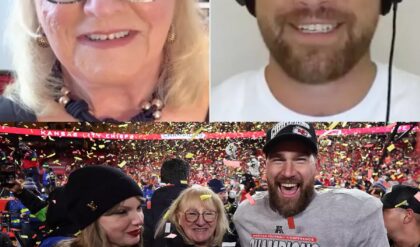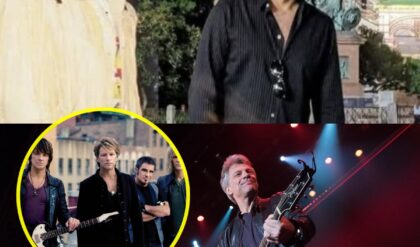Although a top name in country music, Miranda Lambert once dreamed about standing on stage in front of a sea of fans. Besides just dreaming, the singer moved to make that dream a reality when she appeared on the show Nashville Star.
While gaining praise, she ended her time on the show, coming in third place. But again, not letting it stop her, Lambert eventually landed in the spotlight. And her dreams couldn’t compare to reality when she received the chance to perform at the ACM Awards alongside country legend George Strait.
When it comes to hit songs, there are few who compare to Strait. Throughout his career, the singer released songs like “I Cross My Heart”, “Check Yes or No”, and “Amarillo by Morning.” With so many hit songs, the country singer holds the record for most No. 1 songs on all charts by an artist. And that achievement is across all genres of music. Again, carving out his own space in country music, Strait and Lambert appeared to make history when they performed “Run.”

Receiving millions of views since making its way online, fans showered both Strait and Lambert with praise, labeling them the “most magical duo” of all time.
“George Strait is the definition of country music,” one fan wrote. Another added, “My two favorite artists singing my favorite song?!?! Doesn’t get any better than that!”
George Strait Helped Miranda Lambert When It Came To Her Father
Outside of sharing the stage together, Lambert once discussed how Strait helped her get over an argument with her father Rick Lambert. “When I was on tour with George, I was 22 and my dad was on the road with us. And I had gotten a tattoo, and it ruffled my dad’s feathers pretty good, and he was really, really mad. We rode the same bus together on the Strait tour, and so I had to wear long sleeves for two weeks and he wouldn’t talk to me.”
With word about the argument getting to Strait, the singer had a wonderful idea that featured the entire crew wearing temporary tattoos for a group photo. Following through with his idea, Lambert recalled, “When we took our group picture, everyone that was in the photo, which was like 60 people, rolled up their sleeve and they all had a tattoo exactly where my tattoo was, even my dad. So I have to thank George for helping me get back to talking to my father again after I got my horrid, hideous tattoo. So thanks George, for mending our relationship.”

Behind the Meaning of George Strait and Alan Jackson’s “Murder On Music Row”
Anyone with a vested interest in the music industry will have opinions on it. Every artist has their own opinion about how best to serve their genre. Those myriad opinions can often be at odds with one another. Enter George Strait and Alan Jackson’s “Murder On Music Row.”
Though many artists have thrived on the popification of country music–moreover it has given the genre more ears–Strait and Jackson have seen that shift as a damning departure from the soul of country. They said as much in this 2000 release. Uncover the meaning behind this seething berate towards the country machine, below.
Behind the Meaning of George Strait and Alan Jackson’s “Murder On Music Row”
Nobody saw him runnin’
From sixteenth avenue
They never found the fingerprint
Or the weapon that was used
But someone killed country music
Cut out its heart and soul
They got away with murder
Down on Music Row
Many traditionalists in the country camp look to artists from an age gone by as the standard to which all other artists are measured. Hank Williams. Johnny Cash. Loretta Lynn. These classic country artists still have a firm foothold in the genre’s fandom today. As with all things, progress comes raring its head–whether you deem it positive progress or not.
In 2000, country music was experiencing a shift. Pop and rock tones were being introduced into the genre at impressive rates. Long gone were the dulcet tones of acoustic instrumentation and simple rhythms–i.e. the “Three Chords and the Truth” mentality. Strait and Jackson reckoned someone should pay for that trend. Though they weren’t sure of the exact culprit, they knew the scene of the crime: Nashville’s Music Row.
The almighty dollar
And the lust for worldwide fame
Slowly killed tradition
And for that someone should hang (Oh, you tell them Alan)
They all say “Not guilty!”
But the evidence will show
That murder was committed
Down on Music Row
The Nashville sound started to gain traction in the ’50s. It was polished and removed the authentic grit that the genre formed around back when it was an oral tradition. It became deeply popular for country singers of that era. Mostly, we have to think, because it earned them stardom on a level the genre hadn’t seen before. Though it wears a different face, that same sentiment is continued in Nashville today. Pop-friendly melodies, picture-perfect vocals, and catchy refrains run rampant in Music City.
Strait and Jackson attributed that to a chase of the almighty dollar. He blamed the songwriters and artists on Music Row (an area of town with recording studios and labels lining the street) for proliferating that chase. They felt the genre had lost its pursuit of the truth, no matter the cost.
Many fans agreed with Strait and Jackson’s perspective, making this song a certified hit. Revisit “Murder On Music Row,” below.
For the steel guitars no longer cry
And the fiddles barely play
But drums and rock ‘n’ roll guitars
Are mixed up in your face
Ole Hank wouldn’t have a chance
On today’s radio
Since they committed murder
Down on Music Row

Photo by Paras Griffin/Getty Images for ATLive





